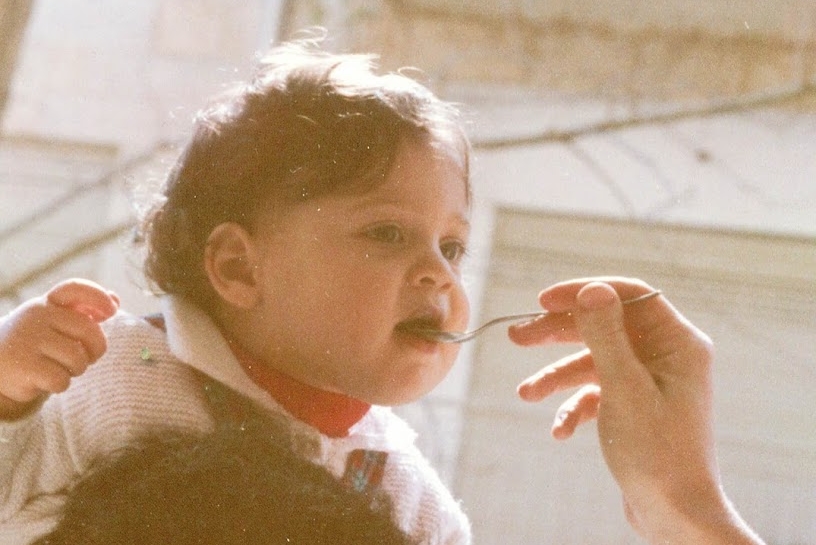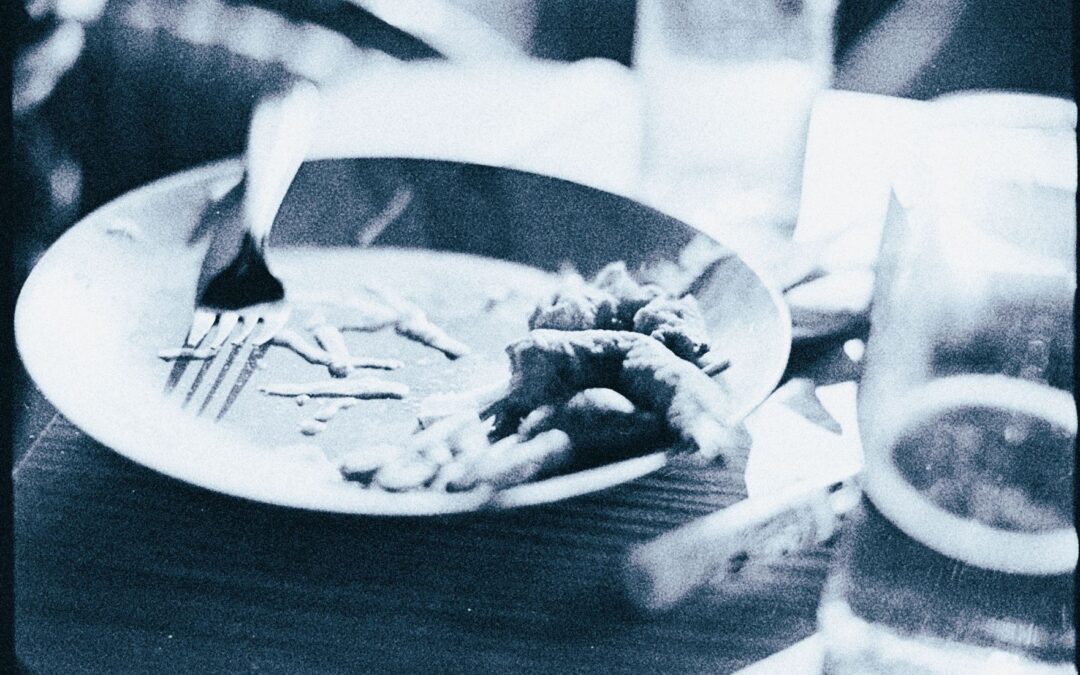There’s mercy killing, mercy sex, and (introducing….) mercy eating.
If Google is a good Greek teacher, mercy eating should be formally named Eutrophia. Not as fancy as euthanasia, but sounds sophisticated nonetheless!
Are you already thinking, “OMG, I know what she’s talking about and I so do it, too!” Read on. (If you’re thinking, “The woman is mad, I have no idea what she wants,” also, read on.
Euthanasia (from Greek: εὐθανασία ‘good death’: εὖ, eu ‘well, good’ + θάνατος, thanatos ‘death’) is the practice of intentionally ending life to relieve pain and suffering.
Eutrophia (from Greek: εὐτροφία ‘good food’: εὖ, eu ‘well, good’ + τροφή, trofí ‘food’) is the practice of mindlessly eating leftover food to avoid feeling bad about throwing it away.
Or if you prefer English, Mercy Eating.
My parents grew up in the 1940’s during and after WWII, under extreme food rationing. Throwing away food was practically a crime. When I was young, not only was I expected to polish off my plate, but also help finish my brother’s leftovers. He was a super picky eater, so my parents were grateful if he ate anything. But then, they didn’t have the heart to throw away the rest, and tried to auction it off to the rest of us. Having to finish everything off of other people’s plates is Olympic level food mind-f*ckery. You have to agree with me on that one…
To my parents’ credit, I must say that they never piled our plates up with enormous amounts of food. They always said you can take as many helpings as you want, but “don’t eat with your eyes.” This, too, was in order not to waste food, but it’s actually an idea I respect and teach my kids today.

This upbringing has compounded with my anxiety and guilt about the environmental crisis, and the inordinate (yes, criminal) amounts of food waste.
The United Nations Food and Agriculture Organization (FAO) recently published a report on the environmental aspects of food loss and waste. Some key findings were:
- The global volume of edible food wastage is estimated at 1.3 billion tons. This is approximately one third of our total production. (Other estimates are even higher, as much as 2.5 billion tons!)
- The total volume of water used each year to produce food that is lost or wasted (250km3) is equivalent to the annual flow of Russia’s Volga River, or three times the volume of Lake Geneva.
- Similarly, 1.4 billion hectares of land – 28% of the world’s agricultural area – is used annually to produce food that is lost or wasted.
- The direct economic consequences of food wastage (excluding fish and seafood) run to the tune of $750 billion annually.
Oh, God. This is not information I need to hear. So much damage! In my guilty mind, when I’m about to throw away a piece of food, bread, let’s say, I see its entire life flash before my eyes!
I see the farmers get the seeds, sow, water, fertilize, deal with pests and the weather, reaps, separate the chaff, and send the wheat off (using fuel, creating emissions) to a flour mill. It is ground, packed, and sent by more gas-guzzling trucks to bakeries. In the bakery, the flour is combined with other ingredients that also travel from afar, loaded with energy and care. The bakers knead the dough. It rises, gets shaped, rises again, baked, packed, and travels again to a logistical center and then distributed. At my local store, our friendly staff puts more energy into sorting and organizing everything. Then I prance in and buy the bread! The bread is so happy to finally fulfill its life purpose and nourish my family! So we promptly ignore it until it is about to go bad.
The poor piece of bread (or fruit, or whatever.) I feel so bad for them, that to save them from a tragic death in the trash, I am determined to eat them myself.
This is such twisted logic!
How will my being unhealthy help the environment? Clearly through the same cosmic-guilt-cycle mechanism that was so helpful to the starving kids in Africa back in the 80s, when kids in affluent countries were forced to clear their plates.
And yet, I still do it.
Many weight loss programs tell you to always leave something on your plate, never polish it off. This is part of training yourself to listen to your body, and let it signal to you when you’ve had enough.
I appreciate the idea, but struggle to implement it. I prefer to prevent overeating with my multiple small helpings system.
I also like sharing dishes in restaurants to avoid ordering too much. Of course, this only works if you order fewer dishes than the number of diners. Or at least fewer main courses, which tend to be (a) too large and (b) arrive when you’re already quite full. Sometimes the servers inadvertently shame me at this point… Often, it’s my kids who are embarrassed.
- Server: “And what will you have as a main course?”
- Me: “Nothing, I’m good.”
- Kids: “She eats our leftovers! C’mon, mom, it’s ridiculous. Order something for yourself!”
- Me: Shame.
So I order a dish, bag the leftovers, and find myself with the same problem: refrigerated food items that are still perfectly edible, but no one wants to eat.
The college student approach to this is to stick them so far back that no one sees them as they rot. Once you can see the green mold through the container, or the fridge starts reeking, it’s easy to throw these items out. After all, you’re not wasting, you’re cleaning!
But I, unfortunately, am an adult, and I remember what food I have in the fridge, even if it lurks at the far end of the shelf.
On the rare occasions that I have room in my freezer, I can tuck leftovers there. They stay there for years, like wooly mammoth carcasses in the icy land of Siberia. When thawed, they are equally appetizing.
The only real solution that I have found to dealing with leftovers maturely and bravely is to clear the fridge in the morning. Research shows that we have much more willpower and decision making power early in the day. As we make more decisions and go through mentally taxing tasks, we become less able to resist all kinds of temptation or bad behavior. Additionally, I’m far less hungry in the morning, so I’m less likely to think eating is the solution.
It also helps to reflect on how to manage the process mentally. I can respect my upbringing and the generations before me that shaped my approach. At the same time, I can appreciate that it makes no sense to sabotage my own health in order to help the planet. I tell myself, “I don’t do eutrophia!” breathe deeply, thank the planet for my food, and throw it away.
PS – Just as a visual illustration, this video is the 16–minute version of my food’s life flashing before my eyes… Please click around and don’t watch it in full. I can’t be responsible for more waste!



I’m the worst offender when it comes to this. I refuse to throw food out if it’s at all good justifying it by thinking that it’s better someone gets those calories rather than completely wasting them, but of course, all I’m doing is “WAISTING” them. Ugghh.
Very informative post, Shlomit. I have never really done this, because I don’t feel it’s any less a waste to eat food I don’t want and my body doesn’t need than it is to throw it in the garbage. When my son was little, I was a little challenged, because toddlers waste so much! But really, that’s because they stop eating when they are full and they don’t yet have all the social constructs we adults do around wasting food. After a few bites of cold Annie’s Mac & Cheese I decided I wanted to be more like my son. We, like you, try to take what we’re going to eat, and I’m a huge fan of leftovers, and freezing food when I make big batches. Great post! Thanks!
This is a real thing! I definitely feel guilty. I live in a home with a yard so I can have a composter. Knowing it will go into my garden helps circumvent the guilt.
Yup. Not enough composting options for me in the city, though. Urrr…
I love this message and can definitely relate! For anyone who goes through this, maybe it’s a reframe of thinking “no food must be wasted” to “food as a way to celebrate what my body is capable of” can take the pressure off consumption and shift it to a celebration.
OMG, this is both funny and sad. My husband is a mercy eater, so I don’t ever have to feel like consuming something so it doesn’t get thrown out – that’s typically what he does. Interestingly, body image is more a thing of concern for him than me too…..
That’s funny! Always better to delegate the dirty work…. 😀
I used to do this a lot until a friend of mine said, “You can throw it away in your body or you can throw it away in the trash.” I had never thought of it that way, and it really helped!
You know, I’ve heard that before too, and it didn’t do the trick… 🙁 I’m glad it worked for you!!
Food is full of emotions (and cultural implications) – and so is health and body image. What a great post!